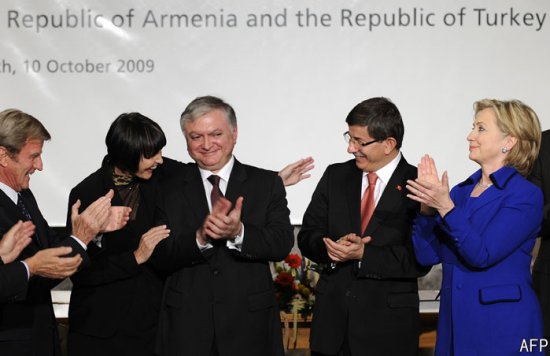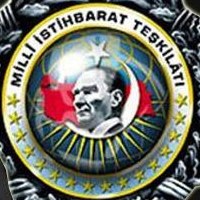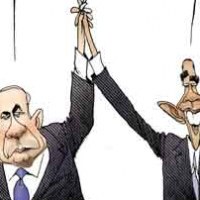![]()
Thu, Dec 30, 2010 | WikiLeaks

Switzerland's Foreign Minister Calmy-Rey "is riding high on a series of foreign policy successes," according to a leaked U.S. embassy cable. She is seen here next to Armenia's Foreign Minister Edouard Nalbandian after the signing of the Armenia - Turkey Protocols. From left to right: French Foreign Minister Bernard Kouchner, Micheline Calmy-Rey, Edouard Nalbandian, Turkey's Ahmet Davutoglu, U.S. Secretary of State Hillary Clinton. (Oct 10, 2009, Zurich - Photo: AFP).
WikiLeaks: Switzerland’s Biggest Challenge is Its Continuing Crisis with Libya
A secret October 2009 cable from Bern, written by the US ambassador Donald Beyer, briefed Hillary Clinton for her upcoming Swiss trip (on October 10, 2009) to Zürich about “the biggest challenge on Switzerland’s foreign policy front and its continuing crisis with Libya, following the July 2008 arrest of Muammar Gaddafi’s son Hannibal Gaddafi in Geneva for allegedly brutally abusing his domestic staff.”
Source: WikiLeaks
Thursday, 08 October 2009, 10:33
S E C R E T BERN 000432
SIPDIS
FOR THE SECRETARY FROM AMBASSADOR BEYER
EO 12958 DECL: 10/08/2019
TAGS PREL, OVIP”>OVIP, SZ
SUBJECT: SCENESETTER: YOUR OCTOBER 10 VISIT TO ZURICH
Classified By: Ambassador Donald S. Beyer; reasons 1.4(b) and (d).1. (S) I and the rest of the Embassy Bern team are looking forward to your visit with great anticipation in what promises to be a landmark event in Armenian-Turkish relations with lasting benefits for Euro-Atlantic security. Foreign Minister Calmy-Rey is riding high on a series of foreign policy successes, from the Swiss government’s agreement with DOJ in the UBS matter, to Switzerland’s hosting of the October 1 P5 1 talks with Iran in Geneva, to the upcoming October 10 signing ceremony in Zurich to chart a path for normalization of relations between Turkey and Armenia.
2. (S) While Calmy-Rey has reasons to celebrate, her foreign policy activism is not universally appreciated across the domestic political spectrum in Switzerland. Swiss views are colored by Switzerland’s centuries-old tradition of neutrality. Issues that draw on the Swiss capacity for facilitation and mediation, such as Turkish-Armenian rapprochement, generally enjoy strong public support. On the other hand, foreign policy activism with a more partisan or “hard” security flavor, such as Calmy-Rey’s vociferous support for Kosovo independence, or her recent all out — but ultimately unsuccessful — effort to obtain a parliamentary mandate for Swiss military participation in the EU anti-piracy operation Atalanta, do not enjoy the same broad public support. The recent arrest at the Zurich airport of film director Roman Polanski was viewed by Calmy-Rey as putting a dent in Switzerland’s international image. Nevertheless, she has limited her criticism to remarking that the arrest lacked “finesse,” and surely is aware that Swiss public opinion favors Polanski’s extradition to the United States.
3. (S) Probably the biggest challenge on Switzerland’s foreign policy front is its continuing crisis with Libya, following the July 2008 arrest of Muammar Gaddafi’s son Hannibal Gaddafi in Geneva for allegedly brutally abusing his domestic staff. Swiss President Merz’s ill-fated visit to Tripoli in late August, during which he publicly apologized for what by all accounts was a justified police action, thus far has failed to win the freedom of two Swiss businessmen that the Libyan government has refused to allow to leave Libya for over a year. The two Swiss citizens are being refused departure purportedly because of visa irregularities, but it is clear to all that Tripoli views them as a bargaining chip in extracting maximum concessions from the Swiss. Moreover, after living under house arrest for the past year, the two businessmen recently were taken by Libyan officials to an undisclosed location, further raising concern in Bern about their fate. Calmy-Rey has asked for USG assistance in pressing the Libyans to allow the two Swiss to return to Switzerland. I strongly believe it is in our interest to do what we can, given Switzerland’s many efforts to assist U.S. citizens in Iran, including, most recently, the cases of the three hikers and the release earlier this year of Roxana Saberi.
4. (S) Finally, Calmy-Rey has been very active is urging the Swiss government to accept for resettlement in Switzerland several Guantanamo detainees who are slated for release. This idea is not at all popular with the Swiss public, but Calmy-Rey views it as a consequent gesture against the backdrop of the Swiss government’s past criticisms of Guantanamo. A Swiss team visited Guantanamo in August to interview four detainees, and is looking seriously at accepting an Uzbek and two Uighurs. The Swiss government, however, is concerned that agreeing to accept Uighurs would buy too much trouble with China at a time when Switzerland is seeking to conclude a trade agreement with Beijing. Personal encouragement from you to Calmy-Rey underlining how much the USG would appreciate Switzerland accepting Uighurs would be particularly timely while you are in Zurich.
5. (U) Minimize considered. BEYER



 RSS
RSS











#WikiLeaks: #Switzerland's Biggest Challenge is Its Continuing Crisis with #Libya | #U.S. http://j.mp/gwORnt
#WikiLeaks: #Switzerland's Biggest Challenge is Its Continuing Crisis with #Libya | #U.S. http://j.mp/gwORnt
RT @CrethiPlethi: #WikiLeaks: #Switzerland's Biggest Challenge is Its Continuing Crisis with #Libya | #U.S. http://j.mp/gwORnt